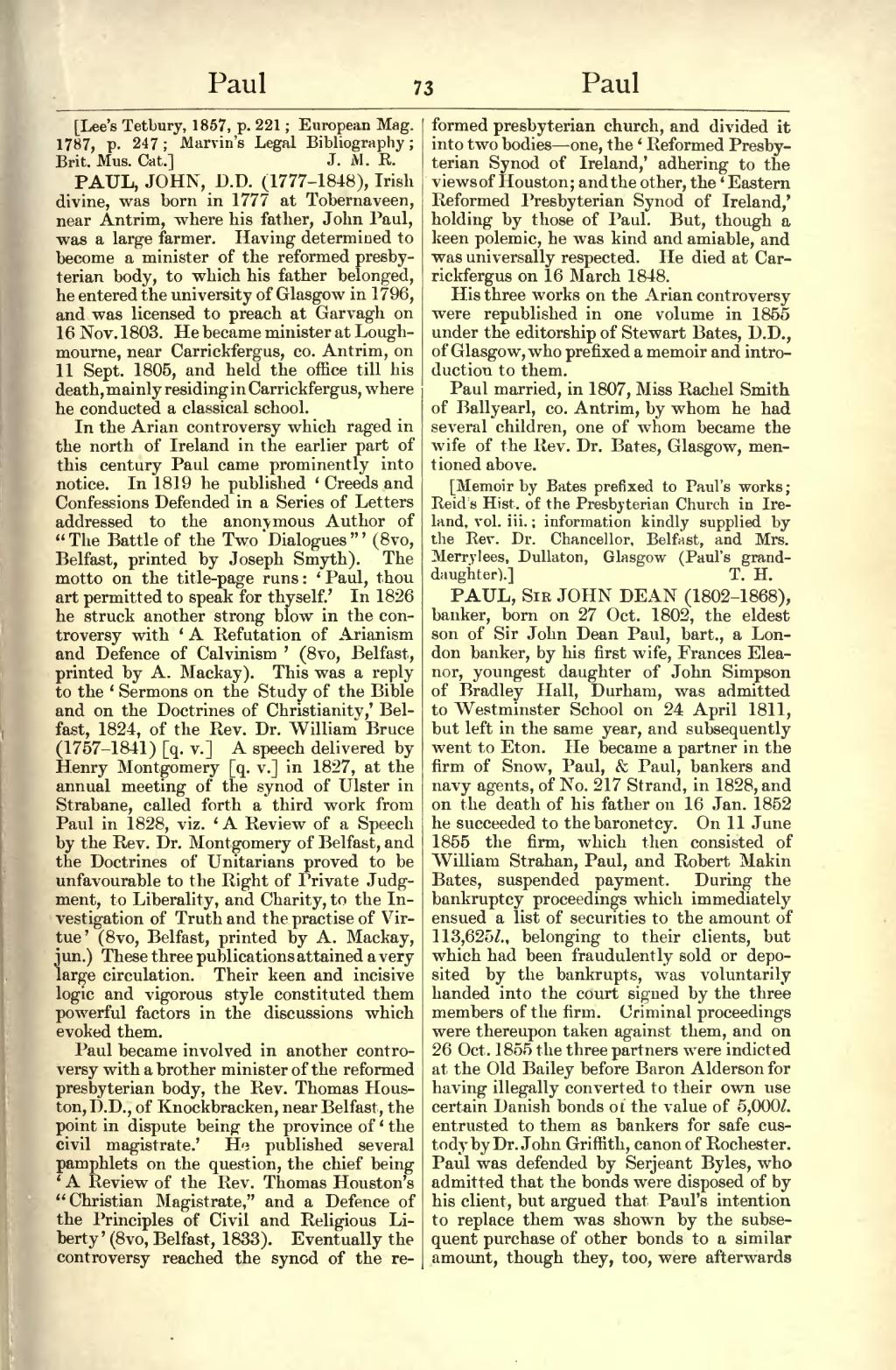[Lee's Tetbury, 1857, p. 221; European Mag. 1787, p. 247; Marvin's Legal Bibliography; Brit. Mus. Cat.]
PAUL, JOHN, D.D. (1777–1848), Irish divine, was born in 1777 at Tobernaveen, near Antrim, where his father, John Paul, was a large farmer. Having determined to become a minister of the reformed presbyterian body, to which his father belonged, he entered the university of Glasgow in 1796, and was licensed to preach at Garvagh on 16 Nov. 1803. He became minister at Loughmourne, near Carrickfergus, co. Antrim, on 11 Sept. 1805, and held the office till his death, mainly residing in Carrickfergus, where he conducted a classical school.
In the Arian controversy which raged in the north of Ireland in the earlier part of this century Paul came prominently into notice. In 1819 he published ‘Creeds and Confessions Defended in a Series of Letters addressed to the anonymous Author of “The Battle of the Two Dialogues”’ (8vo, Belfast, printed by Joseph Smyth). The motto on the title-page runs: ‘Paul, thou art permitted to speak for thyself.’ In 1826 he struck another strong blow in the controversy with ‘A Refutation of Arianism and Defence of Calvinism’ (8vo, Belfast, printed by A. Mackay). This was a reply to the ‘Sermons on the Study of the Bible and on the Doctrines of Christianity,’ Belfast, 1824, of the Rev. Dr. William Bruce (1757–1841) [q. v.] A speech delivered by Henry Montgomery [q. v.] in 1827, at the annual meeting of the synod of Ulster in Strabane, called forth a third work from Paul in 1828, viz. ‘A Review of a Speech by the Rev. Dr. Montgomery of Belfast, and the Doctrines of Unitarians proved to be unfavourable to the Right of Private Judgment, to Liberality, and Charity, to the Investigation of Truth and the practise of Virtue’ (8vo, Belfast, printed by A. Mackay, jun.). These three publications attained a very large circulation. Their keen and incisive logic and vigorous style constituted them powerful factors in the discussions which evoked them.
Paul became involved in another controversy with a brother minister of the reformed presbyterian body, the Rev. Thomas Houston, D.D., of Knockbracken, near Belfast, the point in dispute being the province of ‘the civil magistrate.’ He published several pamphlets on the question, the chief being ‘A Review of the Rev. Thomas Houston's “Christian Magistrate,” and a Defence of the Principles of Civil and Religious Liberty’ (8vo, Belfast, 1833). Eventually the controversy reached the synod of the reformed presbyterian church, and divided it into two bodies—one, the ‘Reformed Presbyterian Synod of Ireland,’ adhering to the views of Houston; and the other, the ‘Eastern Reformed Presbyterian Synod of Ireland,’ holding by those of Paul. But, though a keen polemic, he was kind and amiable, and was universally respected. He died at Carrickfergus on 16 March 1848.
His three works on the Arian controversy were republished in one volume in 1855 under the editorship of Stewart Bates, D.D., of Glasgow, who prefixed a memoir and introduction to them.
Paul married, in 1807, Miss Rachel Smith of Ballyearl, co. Antrim, by whom he had several children, one of whom became the wife of the Rev. Dr. Bates, Glasgow, mentioned above.
[Memoir by Bates prefixed to Paul's works; Reid's Hist. of the Presbyterian Church in Ireland, vol. iii.; information kindly supplied by the Rev. Dr. Chancellor, Belfast, and Mrs. Merrylees, Dullaton, Glasgow (Paul's granddaughter).]
PAUL, Sir JOHN DEAN (1802–1868), banker, born on 27 Oct. 1802, the eldest son of Sir John Dean Paul, bart., a London banker, by his first wife, Frances Eleanor, youngest daughter of John Simpson of Bradley Hall, Durham, was admitted to Westminster School on 24 April 1811, but left in the same year, and subsequently went to Eton. He became a partner in the firm of Snow, Paul, & Paul, bankers and navy agents, of No. 217 Strand, in 1828, and on the death of his father on 16 Jan. 1852 he succeeded to the baronetcy. On 11 June 1855 the firm, which then consisted of William Strahan, Paul, and Robert Makin Bates, suspended payment. During the bankruptcy proceedings which immediately ensued a list of securities to the amount of 113,625l., belonging to their clients, but which had been fraudulently sold or deposited by the bankrupts, was voluntarily handed into the court signed by the three members of the firm. Criminal proceedings were thereupon taken against them, and on 26 Oct. 1855 the three partners were indicted at the Old Bailey before Baron Alderson for having illegally converted to their own use certain Danish bonds of the value of 5,000l. entrusted to them as bankers for safe custody by Dr. John Griffith, canon of Rochester. Paul was defended by Serjeant Byles, who admitted that the bonds were disposed of by his client, but argued that Paul's intention to replace them was shown by the subsequent purchase of other bonds to a similar amount, though they, too, were afterwards
